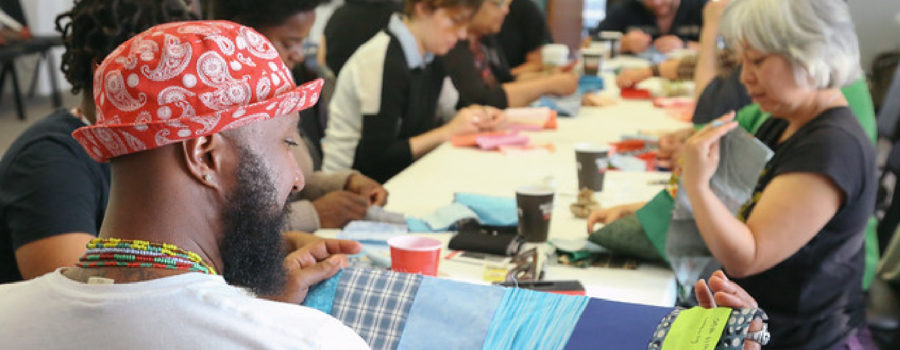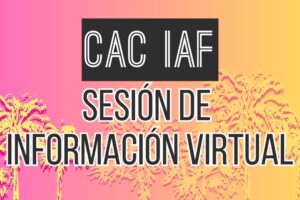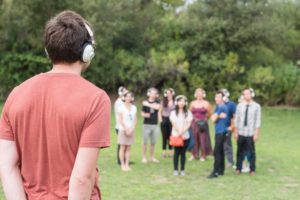SUNDAY, MAY 6, 2018
“Open dialogue and powerful moments of realization…” —Hyperallergic
LONG TABLE & DURATIONAL SEWING BEE
ORGANIZED WITH EMILY JOHNSON / CATALYST
Umyuangvigkaq is “a place to gather ideas,” and this free Long Table and Durational Sewing Bee gathers Indigenous thinkers, artists and allies to engage in generous activity, while exploring the intersections of contemporary Indigenous and American cultures.
Led by Emily Johnson (Yup’ik), Karyn Recollet (Cree) and Cindi Alvitre (Gabrieliño/Tongva), the Long Table is a space to center Indigenous voices in the art world and beyond. New topics unfold throughout the event, encouraging personal reflections and critical interventions, as well as storytelling and other First Nations knowledge forms.
Umyuangvigkaq: Yaanga invites all participants to listen, to speak, and to express themselves through sewn messages on quilt squares—contributing to a more than 4,000-square-foot quilt designed by Maggie Thompson (Fond Du Lac Ojibwe), which becomes a blanket for audiences around the country as part of Johnson’s all-night performance gathering Then a Cunning Voice and A Night We Spend Gazing at Stars.
• • •
We acknowledge this gathering is held on the lands of the Tongva people. We acknowledge and pay respect to generations of Tongva elders and ancestors and offer gratitude to Tongva people, land and waters of Yaanga (Downtown Los Angeles).
3–9PM // ACE HOTEL DTLA, SEGOVIA HALL
929 S Broadway, Los Angeles, CA 90015
// RSVP //
This event is free. Reservations recommended.
Click here for suggested readings and resources offered by the Umyuangvigkaq Provocateurs.
• • •
Presented in conjunction with the Indigenous Choreographers at Riverside gathering, hosted and co-directed by Jacqueline Shea Murphy and María Regina Firmino-Castillo, April 27 to May 6, 2018. Full program details at http://icr.ucr.edu.
Made possible with generous support from Ace Hotel DTLA; the Western States Arts Federation (WESTAF) with funding from the California Arts Council and the National Endowment for the Arts; and California Humanities, a non-profit partner of the National Endowment for the Humanities, www.calhum.org.
![]()
![]()

![]()
Photo by Chris Cameron
ABOUT EMILY JOHNSON
Emily Johnson is an artist who makes body-based work. A Bessie Award winning choreographer and Guggenheim Fellow, she is based in Minneapolis, Minnesota and New York City. Originally from Alaska, she is of Yup’ik descent and since 1998 has created work that considers the experience of sensing and seeing performance. Her dances function as installations, engaging audiences within and through a space and environment—interacting with a place’s architecture, history, and role in community. Emily is trying to make a world where performance is part of life; where performance is an integral connection to each other, our environment, our stories, our past, present, and future. Emily received a 2014 Doris Duke Artist Award; her work is supported by Native Arts and Cultures Foundation, Creative Capital, Map Fund, a Joyce Award, the McKnight Foundation, and The Doris Duke Residency to Build Demand for the Arts. Emily was a fellow at the Institute for Advanced Study at the University of Minnesota 2013–2014 and an inaugural 2014 Fellow at the Robert Rauschenberg Residency. She is a current Mellon Foundation Choreography Fellow at Williams College. With her collaborators she recently completed the third in a trilogy of works: The Thank-you Bar, Niicugni, and SHORE. Her newest work is Then a Cunning Voice and a Night We Spend Gazing at Stars, an all-night outdoor performance gathering that takes place on and near eighty-four community-made hand-sewn quilts.
ABOUT KARYN RECOLLET
Karyn Recollet is an Assistant professor in the Women and Gender Studies Institute at the University of Toronto. Karyn is an urban Cree, residing in the traditional territories of the Petun, Wendat, Mississauga’s of the New Credit, Dish with One Spoon treaty territory. Karyn’s research explores the various intersections of Indigenous artistic activations rooted in the multiple layered Indigenous territories that are urban spaces. Karyn’s focal points are choreographic fugitivity, Indigenous futurities, and decolonial love. Karyn’s publications include articles “Glyphing Decolonial love, Gesturing Indigenous futurities.” She has co-edited, alongside Eve Tuck, Native Feminist Texts (a special edition of English Journal). Karyn is currently working on a manuscript entitled Urban glyphs: fugitivities, futurities, and radical decolonial love.
ABOUT CINDI ALVITRE
Cindi Moar Alvitre is a mother and grandmother and has been an educator and artist activist for over three decades. She is a descendant of the original inhabitants of Los Angeles and Orange Counties, and served as the first woman chair of the Gabrieleno/Tongva Tribal Council. In 1985, she and Lorene Sisquoc co-founded Mother Earth Clan, a collective of Indian women who created a model for cultural and environmental education, with a particular focus on traditional art. In the late 1980s, she co-founded Ti’at Society sharing in the renewal of their ancient maritime practices of the coastal/island Tongva, extending into the public realm as participants in the World Festival of Sacred Music. Cindi is currently NAGPRA Coordinator & full-time Lecturer at CSULB. As a cultural curator, her work extends beyond the physical manifestation of museum exhibition and into ceremonial performitivity, a genre of expression that engages participants into native landscapes as a dimensional “refocusing of our cultural lens.”
ABOUT MAGGIE THOMPSON
Maggie Thompson was born and raised in Minneapolis, MN. She received her Bachelor of Fine Arts in Textiles at the Rhode Island School of Design (RISD) and derives her inspiration from the history of her Ojibwe heritage—exploring family history as well as themes and subject matter of the broader Native American experience. Thompson’s work calls attention to its materiality, pushing the viewer’s traditional understanding of textiles. She explores materials in her work by incorporating multimedia elements such as photographs, beer caps and 3D-printed objects. Thompson has exhibited at institutions such as the Minneapolis Institute of Art and the Plains Art Museum. In addition to her fine arts practice, Thompson runs a small knitwear business known as Makwa Studio. She is also an emerging curator of contemporary Native art at Two Rivers Gallery and has worked on curating special exhibits for the McKnight Foundation and the Minnesota Museum of American Art.




